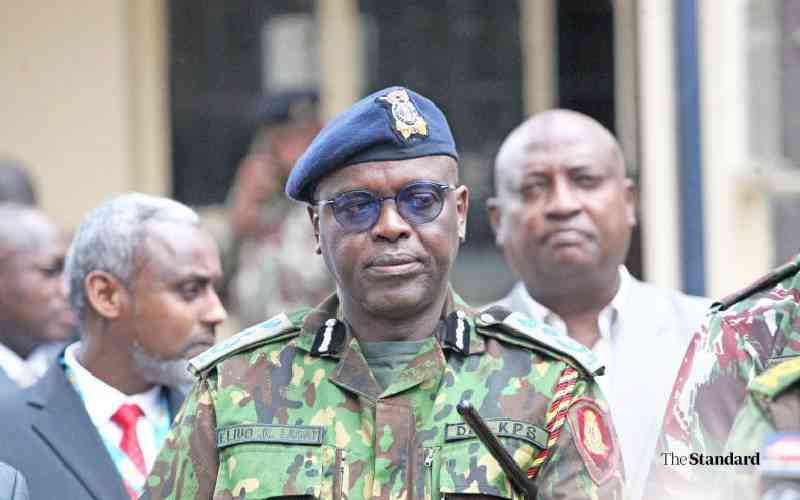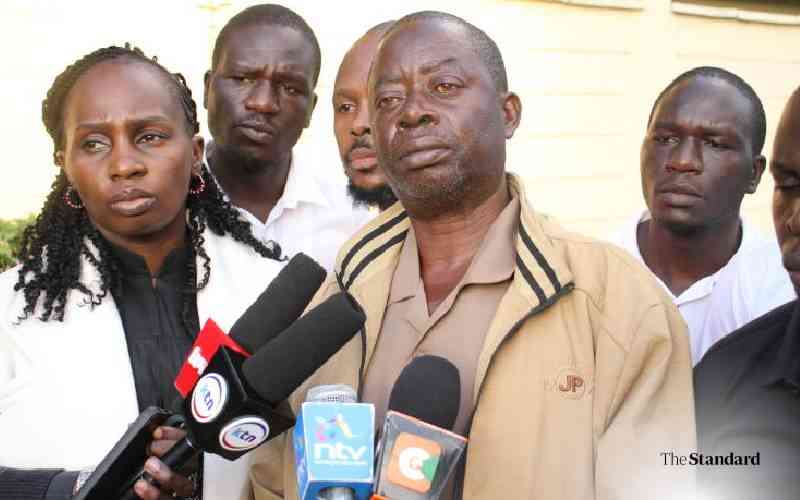When Democracy Turns Deadly: What Albert Ojwang's Case Tells Us About Power and Fear in Kenya
In this powerful essay, Billy Mijungu, a public policy practitioner and advocate for good governance, reflects on the heartbreaking death of 31-year-old teacher Albert Omondi Ojwang in police custody. With clarity and conviction, Mijungu explores what Albert’s story reveals about state power, dissent, and the fragility of democracy in Kenya. He calls on leaders to embrace criticism with maturity and urges society to turn outrage into reform, demanding justice, accountability, and the protection of every citizen’s voice.
Albert Omondi Ojwang is gone. A 31-year-old teacher, a young father, a passionate Kenyan, and a relentless voice for accountability, was silenced most brutally. His story, now at the centre of national outcry, is not just about a death in police custody. It is about how we, as a society, handle dissent, criticism, and openness in a democracy we claim to cherish. It is about how public power reacts to public opinion. It is about the refusal of those in high places to accept the bare truths of our time. And most of all, it is about the deep urgency to draw lines between strength and tyranny.

Source: Facebook
Albert's crime was his speech. Not a weapon. Not violence. Just typed words on a phone screen shared on social media platforms, questioning the competence and conduct of powerful men in uniform. For that, he was arrested in Homa Bay and transported across the country to the heart of the capital. A teacher was placed in police custody for allegedly defaming a Deputy Inspector General of Police—no court order issued—no public threat cited. No emergency declared. Just a man, his phone, his opinion, and the wrath of power that could not take it.
When word came that Albert had died in his cell at Central Police Station Nairobi, the first official explanation was absurd. They said he had hit himself repeatedly against the wall and that he had inflicted fatal injuries on himself. That he had died by his hand. But even that weak lie could not hold. The postmortem told the truth that his killers wished to bury. He had been beaten. His body bore signs of blunt trauma. His neck had compression marks. There was evidence of asphyxiation. He had been silenced in a manner that could only be described as deliberate and cruel.
The public reacted with justified fury. Kenyans from every walk of life took to the streets in Nairobi and elsewhere to demand justice. They sang. They wept. They shouted his name. They reminded the state that it was not above the people. And in rare unity, political leaders joined the chorus. President William Ruto condemned the act. He called it heartbreaking and unacceptable. So did members of the opposition. The state’s watchdog, IPOA, swung into action. Officers were suspended. Arrests were made. Even the CCTV technician was apprehended for tampering with evidence. It was a moment when justice, though late, seemed possible.
Still, one cannot help but mourn more than just the man. We mourn a nation where police brutality is not a mistake but a repeated pattern. We mourn a government that struggles to cope with open dissent. We mourn a culture of fear that still pervades our institutions, decades after we claimed to have opened the democratic space.
Albert was not just a casualty of state power. He was a symbol of something deeper. That our democracy is being tested. Public officers often remain trapped in an outdated mentality that resists critique. That men and women in positions of authority want the trappings of power without the responsibilities it demands. They want titles, prestige, perks, and the fanfare of office. But the moment they are questioned, the moment the public raises a voice, their reflex is suppression. That reflex must now be buried.
It is time for a social media rule book. Not to control what citizens say, but to shape how public officers respond. Social media is chaotic. Yes. It is raw. Yes. It is unfiltered. Absolutely. But it is also where democracy is loudest. Public officers must grow thick skins. In our openness, some issues will be overplayed. Others will be underplayed. But the long and short of it is this: they must learn to live with it. This is democracy. And democracy is noisy.
What is needed now is not less speech, but more structured engagement. We need a public accountability manual that guides powerful officials on how to respond when challenged. When criticised. When mocked. When questioned. Because criticism, no matter how crude or unpleasant, is not a call to violence. It is a call to reflection. A sign that people are watching. And that is how it should be.
Kenya must reduce the power distance between state officers and citizens. That means managing the perks and privileges that create gods out of civil servants. The motorcades, the bodyguards, the aloofness, the impunity, all must be scaled down. Power must be brought closer to the people. And the people must never be punished for simply speaking.
Ojwang’s death should be the last straw. A teacher should not die for tweeting. A father should not be buried because he had opinions. And a nation should not have to mourn simply because someone in power was too fragile to accept dissent. There is something deeply broken when criticism leads to a body in a morgue.

Source: Facebook
To those who order or execute killings to silence critics, understand this: the pain is not with the dead. The pain lives with the living. The pain is with the child left fatherless. The mother was left speechless, and the wife left grieving. With the students left teacherless. The society was left wounded. The logic of killing your critics only proves your weakness. You may bury a man, but you awaken a movement. You silence one voice, but you stir a million more.
This moment demands serious condemnation of careless and deadly acts by police officers. Our security forces are meant to protect, not persecute. Meant to serve, not suppress. Any officer who brutalises civilians betrays the oath of service. And any leadership that allows it is complicit in the crime.
Albert’s story is a warning. A turning point. A tragedy. But it can also be a beginning. A beginning of renewed commitment to accountability. To justice. To democratic maturity. He may be gone too soon, but the echo of his voice must never fade.
Let those in power hear us. You cannot kill the truth. You cannot arrest every opinion. And you certainly cannot silence the soul of a nation that refuses to be cowed. We will speak. We will mourn. We will demand justice. And we will remember.
Albert Ojwang is gone. But what he stood for must remain.
Proofreading by Asher Omondi, copy editor at TUKO.co.ke.
Source: TUKO.co.ke












